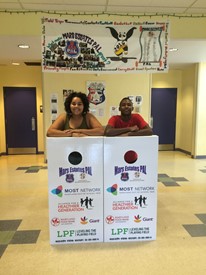
Share On Social!
“MOST”, Maryland Out of School Time Network’s (MOST) Healthy Behaviors Initiative (HBI) has worked to help promote Healthy Eating and Physical Activity (HEPA) standards since 2013.
Today MOST uses VISTA volunteers as afterschool professionals to support 30 programs across the state today. The programs’ work is guided by the Alliance’s Healthy Out of School Time Framework and with funding from the Giant Food Foundation, staff are able to receive professional development training in nutrition from the University of Maryland Extension’s Food Supplement Nutrition Education program.
MOST collaborates with HBI partners like Landsdowne Middle School in Baltimore, who signed onto HBI in its first year and have come to reach specific fitness goals and now participate in a range of new youth activities including basketball, soccer, dodgeball, disk golf and more!
Learning to be an example to youth in all one eat and drinks in front of the kids has been an “eye opener” to many of the staff, especially to Wade Henninger, coordinator of the afterschool program at Mars Estates PAL Center.
“It wasn’t a big transition,” but the annual assessments required of participants were “really an eye opener. The surveys have you take inventory of what you’re doing, and a couple things really make you think.” Henninger explained to the Afterschool Alliance blog.
For example, some of his younger staff had been in the habit of drinking sodas in front of youth, but the survey reminded him of the importance of “sending the right message by setting an example.” Henninger has had to think twice now about drinking a sugary beverage in front of students in the program now.
Other partnerships have also provided healthy snacks and summer meals to afterschool programs.
Kidz Table, a non-profit, Baltimore-bassed vendor associated with St. Vincent de Paul of Baltimore, provides the much-needed nutrition to over 6,00 kids in the city, where around 90% of the kids live in what are considered “food deserts”- communities without access to nutritious foods or grocery stores.
By The Numbers
84
percent
of Latino parents support public funding for afterschool programs




